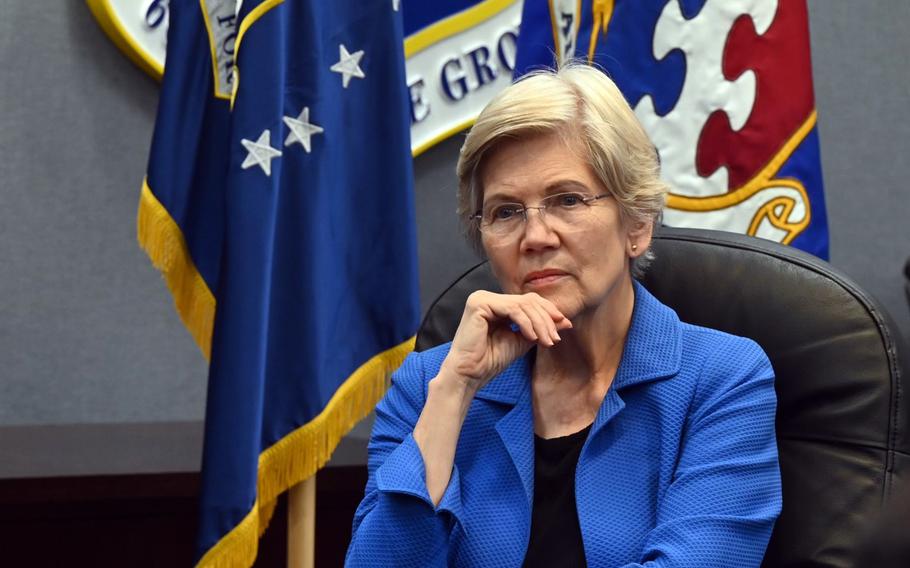
Sen. Elizabeth Warren, D-Mass., visits Hanscom Air Force Base outside Boston, Aug. 3, 2023. (Todd Maki/U.S. Air Force)
YOKOSUKA NAVAL BASE, Japan — Two U.S. senators and a representative remain concerned about gaps in health care access for Defense Department civilians in Japan, they said in a recent letter to the Defense Health Agency.
Strategies to improve DOD civilian health care, staffing issues at military medical facilities and wait times are among questions raised by Sens. Elizabeth Warren, D-Mass., and Tim Kaine, D-Va., and Rep. Michael Burgess, R-Texas, in their March 20 letter to DHA.
“We write in regard to my ongoing concerns that Department of Defense (DoD) civilians and contractors in Japan continue to face problems with access to medical care and that this problem is impacting morale and retention,” the letter states.
The letter to Army Lt. Gen. Telita Crosland, DHA’s director, and Lester Martinez-Lopez, assistant secretary of defense for health affairs, references a Nov. 29 report from the Office of the Inspector General that noted “significant challenges associated with civilians using off-base medical care.”
The lack of care is “having serious and negative impacts on the lives of service members and DoD civilians, causing many to leave their assignments in Japan,” the letter continued.
The letter cites a March 2023 survey by the Japan Civilian Medical Advocacy Group, a grassroots organization lobbying for health care options for DOD civilians. It found that 42% of respondents were “actively in the process of finding a new job” and 60% were considering changing jobs due to health care concerns.
The advocacy group is “extremely grateful” for the letter, said spokeswoman Alexa Freeman, a DOD contractor’s spouse at Yokosuka Naval Base, south of Tokyo.
“It makes us hopeful that our ongoing crisis has not been forgotten; very little has actually changed about the situation for SOFA personnel in Japan and there is no solution from DHA in sight,” she said by Facebook Messenger on Saturday. SOFA is the status of forces agreement that lays out rights and responsibilities of individuals affiliated with the U.S. military in Japan.
Fatal consequences
The letter also notes the sometimes fatal consequences of a lack of adequate health care, and cites the case of a Marine’s 7-year-old daughter who died in January 2023 after falling almost three stories at an Okinawa mall.
A Navy and Marine Corps investigation following the girl’s death discovered that Japanese hospitals turned away at least 24 people affiliated with the U.S. military between January 2022 and February 2023. Several died, the report said, although it does not disclose an exact number.
“We are hopeful that DHA will make meaningful changes so they can provide necessary health care to the total force, but in the meantime our community members continue to struggle, suffer, and in some cases, die,” Freeman said. “It underscores how broken the system still is.”
U.S. Forces Japan, which is monitoring those cases, has not responded to multiple inquiries from Stars and Stripes since Feb. 13 requesting updates on the number of people denied care or who died as a result.
DHA’s Virginia-based spokesman, Peter Graves, has not responded to a request for comment emailed by Stars and Stripes on Thursday.
“Not only is the limited access to care frustrating and financially burdensome, but it has proven to be fatal as well,” the lawmakers wrote in their letter to DHA.
Most Japanese providers do not accept U.S. health insurance. SOFA members are often required to pay on the spot for health care, sums that can reach thousands of dollars.
‘Continue to be concerned’
DHA, under a congressional mandate, is required to prioritize care for Tricare Prime beneficiaries — a plan available to active-duty troops, their families and eligible retirees.
On Jan. 1, 2023, the agency began limiting care for DOD civilians to acute or urgent conditions. Two months later, it rescinded that decision, allowing them to be seen for chronic conditions on a space available basis.
The reversal came after a series of townhall meetings at U.S. bases in Japan where thousands of DOD civilians aired complaints about the changes.
At least one command, the headquarters of U.S. Army Japan at Camp Zama, has attempted to smooth the way for SOFA patients by employing Japanese interpreters who help facilitate care at a local hospital.
The letter from Warren, Kaine and Burgess acknowledges efforts to improve the situation, but says they aren’t enough.
“We appreciate the steps that DHA and [U.S. Indo-Pacific Command] are taking to address these issues,” the letter states. “But we continue to be concerned by reports of problems accessing care, and its impact on morale and retention.”